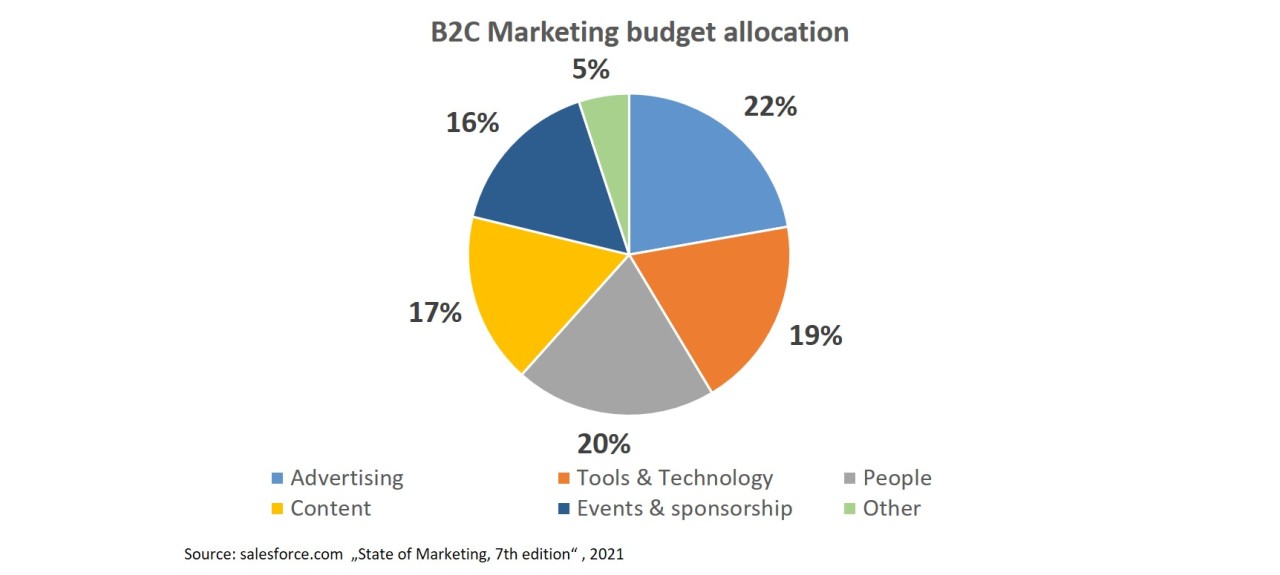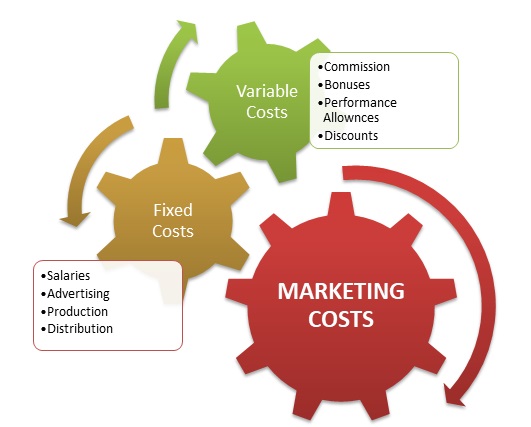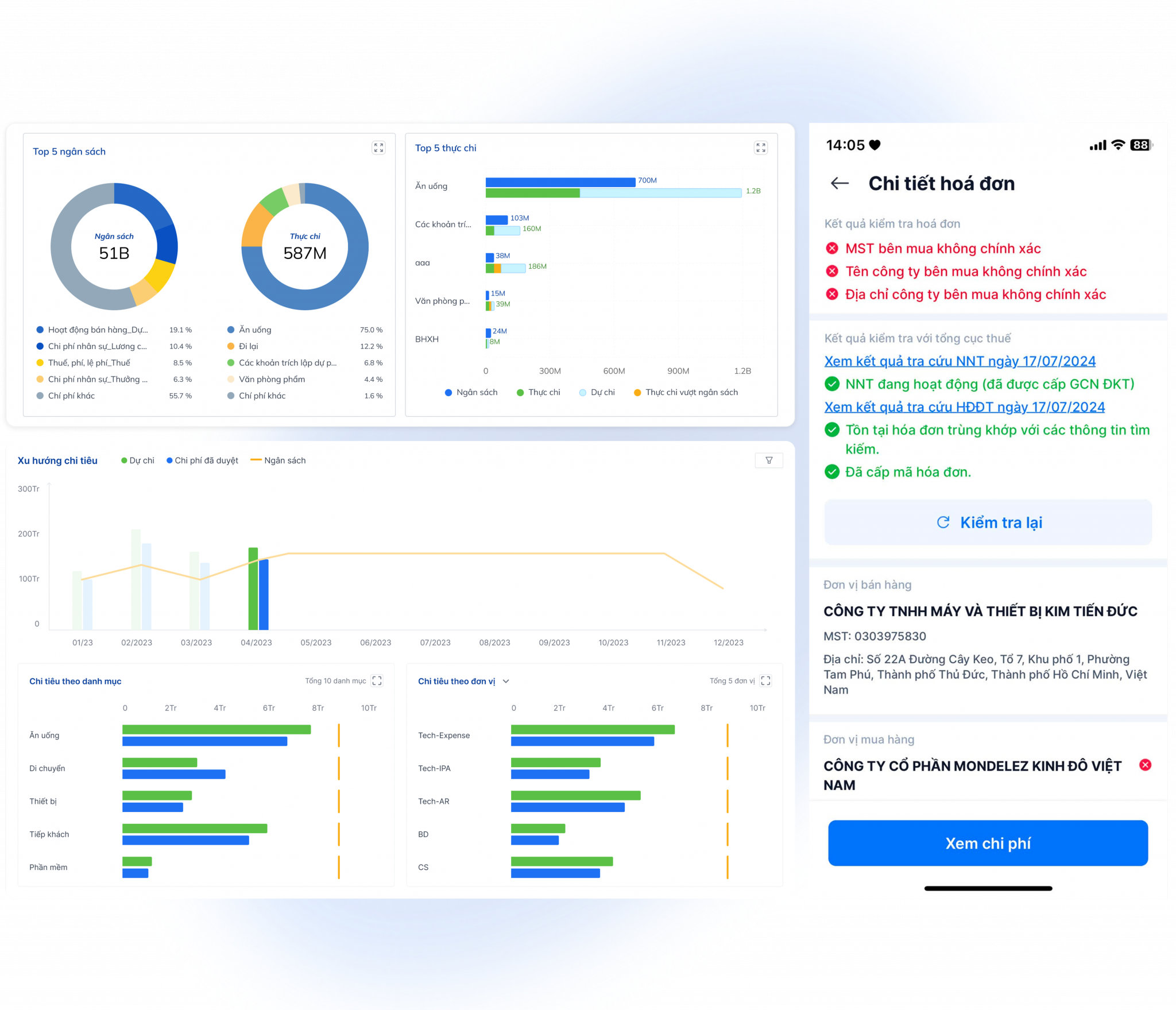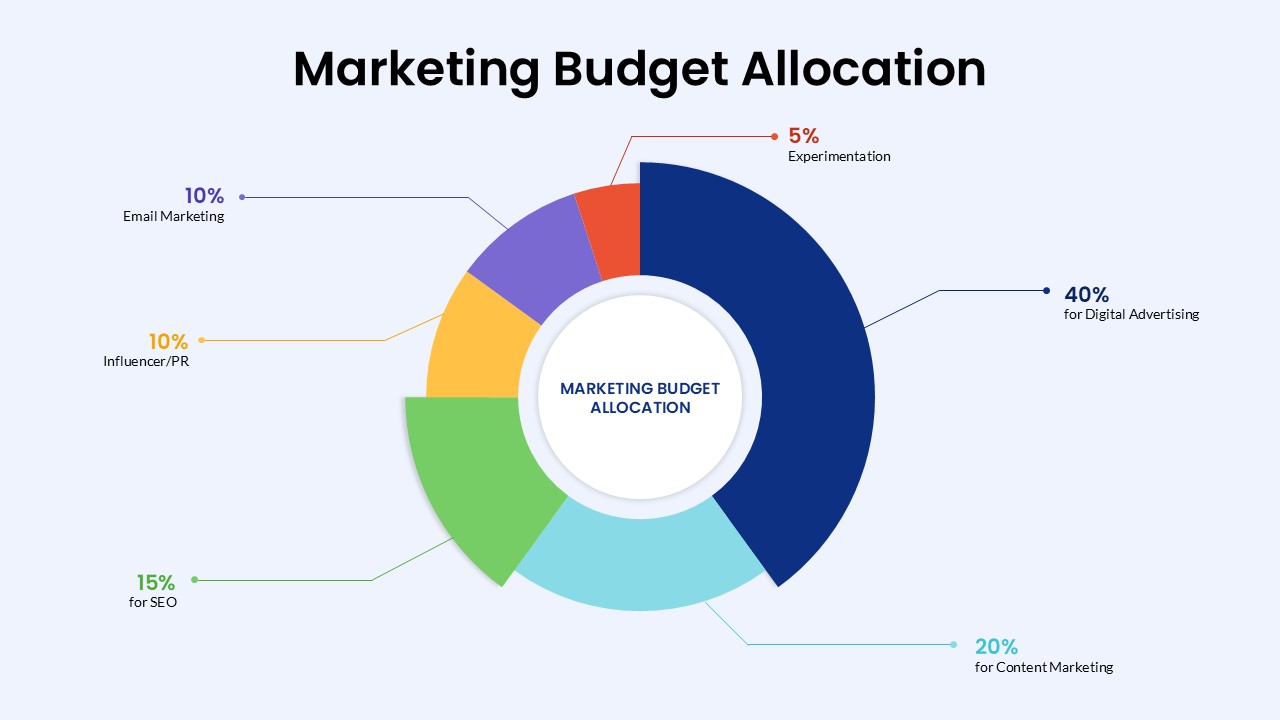Marketing costs are not just advertising costs – they are a strategic investment that helps businesses build their brands, expand market share and create competitive advantages. Understanding the nature of marketing costs and how to classify them will help you. Help managers define clear goals, optimize communication channels, and measure effectiveness.
In today’s increasingly competitive environment, what is the optimal way to ensure cost-effective marketing? Let’s find out with Bizzi in this article.
Marketing Costs: Core Concepts and Role in Business
Marketing costs are not just “consumption” costs but also a strategic investment, directly affecting revenue and competitive advantage.
Definition of Marketing Cost
What is Marketing Cost? It is the entire business budget for marketing, advertising, sales and branding activities with the aim of attracting and retaining customers and generating revenue.
Marketing costs include all expenditures aimed at:
- Market research: survey, analyze customer insight.
- Branding: identity design, media content production.
- Promotion and marketing: advertising (digital, TV, OOH), PR, influencer marketing.
- Sales activation: promotions, events, fairs, sponsorships.
What is the importance of Marketing Costs?
- Increase brand awareness: Help customers know about products and services → create the premise for sales.
- Lead Generation: Advertising activities and marketing campaigns help create demand and attract interested people.
- Boost sales: Marketing campaigns help customers make purchasing decisions faster, increasing revenue.
- Build long-term relationships with customers: Through customer care, remarketing, CRM to retain and increase customer lifetime value (CLV).
- Measure business strategy effectiveness: Track ROAS, ROI, CPA to optimize spending and avoid wasting budget.
Confusing Concept Differences: What are Advertising Costs, Selling Costs and Marketing Costs?
To avoid confusion when budget planning, it is necessary to clearly distinguish between Marketing Costs, Selling Costs, and Advertising Costs.
| Criteria | Marketing costs | Sales Expenses | Advertising Costs |
| Define | Total cost of all activities to research the market, build a brand, and attract customers. | Total costs directly related to the process of selling and distributing a product. | Part of marketing costs focus on communication and promotion to customers. |
| Scope | Broad: Market research, branding, promotion, PR, trade marketing. | Narrower: employee commissions, sales logistics costs, CRM costs. | Very narrow: only includes online/offline advertising costs (Facebook Ads, Google Ads, TVC, OOH...). |
| Main objective | Create demand, increase brand awareness, nurture leads. | Convert leads into actual sales. | Increase coverage and reach of messages to customers in a short time. |
| For example | Market research costs, social media content production costs, event organization costs. | Sales staff salary & commission, shipping costs, POSM costs to support sales. | Budget for running Facebook Ads, TVCs on television, outdoor banner ads. |
| Position on the Financial Statements | Recorded in Selling & Marketing Expenses. | Recorded in the same Selling Expenses section. | Is a small part of Marketing Expenses. |
Common Types of Marketing Expenses by Function
To manage the budget effectively, businesses need to classify marketing costs by main function. This helps control, analyze efficiency (ROI) and optimize budget.
Marketing costs are very diverse, including many different categories:
- Advertising costs: Includes costs for running ads on online platforms (Google Ads, Facebook Ads), traditional advertising (TV, newspapers, radio), and costs for advertising publications.
- PR (Public Relations) costs: Costs for communication activities to build a positive image of the business and products.
- Market research costs: Invest in research to understand customer needs, competitors and market trends.
- Selling expenses: Includes salaries, commissions, benefits and other expenses related to the sales team.
- Personnel costs: Salary, bonus, training for marketing team.
- Brand building and development costs: Invest in logo design, brand identity and core value building campaigns.
- Online Marketing Costs: Including SEO, content marketing, email marketing, social media marketing.

In-Depth View: Classification of Fixed and Variable Costs
In financial management and marketing, distinguishing between fixed and variable costs is an important skill that helps businesses forecast cash flow, optimize budgets and make strategic decisions. This is also a big difference between a basic analysis and an in-depth perspective.
Fixed Costs (Fixed Marketing Cost)
Fixed costs are expenses that do not change with the scale of marketing activities in the short term. Businesses must pay these expenses whether they run a campaign or not. Effectively managing fixed costs helps businesses maintain a reasonable cost structure and increase profit margins as the business expands.
Specific examples:
- Marketing staff salary: Even when sales are zero, the company still has to pay the marketing department.
- Cost of renting management software (CRM, email automation, BI tools): This is a fixed monthly or annual maintenance fee.
- Cost of renting an office or studio for content production: Regardless of the number of videos or campaigns deployed.
Variable Marketing Cost
Variable costs vary with the scale of marketing activities and the level of campaign implementation. The larger the campaign, the higher these costs become. Businesses can flexibly adjust variable costs according to market conditions, ensuring a balance between risk and efficiency.
Specific examples:
- Advertising costs paid for digital platforms (CPC/CPA/CPM): If a business doubles its advertising budget, this cost also doubles.
- Commission paid to partners or KOL/KOC based on sales: Only occurs when there is revenue or conversion.
- Cost of outsourcing content production: Each video, article or livestream will incur separate costs.

What are the methods that businesses can apply to set up Marketing budgets & costs?
Besides understanding the nature of marketing costs, setting up a marketing budget is considered an important step to optimize resources and ensure investment efficiency. Businesses can choose the method that is appropriate to their development stage, industry and strategic goals.
Sales Percentage
This method is most commonly used, especially with B2C businesses.
- Recipe: Marketing Budget = Previous or Expected Budget x Marketing Spending Ratio
- Reference spending rate:
| Type | Marketing Spending Ratio |
| B2C (consumer goods, FMCG) | 5% – 12% revenue |
| B2B (services, SaaS) | 2% – 8% revenue |
Based on Business Objectives
This method is suitable for businesses that want to stick to a growth strategy.
Steps to follow:
- Define marketing goals (e.g. increase 20% in revenue, increase 50,000 leads).
- Build a marketing action plan to achieve goals.
- Estimate the cost of each activity.
Add up the total to get the marketing budget.
Based on available funds
A method for small businesses or startups with limited resources.
Principle:
- Calculate the total operating costs required.
- Take the remaining amount (after deducting fixed costs) to invest in marketing.
Based on competitors.
Method based on the average marketing spending of competitors in the industry.
How to apply:
- Collect information from industry reports, market benchmarks.
- Estimate % of revenue that competitors spend on marketing.
- Budget at or above that if you want to increase market share.
What are the 7 strategic solutions to optimize marketing costs?
To maximize the effectiveness of each dollar spent, businesses need to approach the problem of optimizing marketing costs strategically and systematically. Below are 7 specific actionable solutions:
Focus on the Right Customers
- Identify target customer portrait (ICP – Ideal Customer Profile).
- Use behavioral data, market segmentation to target the right potential customers.
- Avoid wasting budget on out-of-file or non-converting customer groups.
Invest in Digital Marketing Channels
- Prioritize channels with detailed measurement capabilities: Facebook Ads, Google Ads, TikTok Ads.
- Take advantage of Remarketing to retarget engaged customers → increase conversion rate, reduce CPA.
- Flexible budget allocation across high-performing channels.
Focus on Content Marketing & SEO
- Create high-quality content to increase organic traffic.
- Focus on optimizing SEO for websites, blog posts, and video tutorials.
- This is a long-term strategy, reducing dependence on paid advertising costs.
Continuously Measure and Analyze Performance
- Use KPI indicators: ROI, ROAS, CPA, CPL to evaluate effectiveness.
- Set up a real-time monitoring dashboard to optimize budget allocation in a timely manner
- Eliminate low-performing channels/campaigns to reduce waste.

Apply A/B Testing
- Test multiple versions of ads, CTAs, and landing pages to choose the best option.
- Save money by eliminating underperforming campaigns early.
- Increase conversion rates, reduce cost per customer (CAC).
Optimize Internal Processes & Collaboration
- Standardize marketing spend approval processes to reduce processing time.
- Close cooperation between departments (Marketing – Sales – Finance) to allocate budget appropriately.
- Periodically review to eliminate redundant costs and increase capital efficiency.
Applying Technology to Cost Management
Use cost management software Automating the collection, classification and reconciliation of marketing expenses is a choice that many businesses and organizations are applying. Among the current solutions, Bizzi is a leading platform that pioneers comprehensive digitalization to help businesses centrally manage the entire cost and work process, from creating proposals, booking tickets, managing invoices to approving and reporting.
Bizzi's solutions apply AI and RPA technology to automate processes, helping businesses effectively control spending, comply with policies, and intelligently optimize financial resources.

One of the biggest challenges for businesses is Marketing budgets often go over budget. by:
- Advertising costs fluctuate (CPM, CPC increase seasonally).
- Multiple departments approving expenditures leads to difficulty in control.
- Difficult to aggregate cost data from multiple channels (digital, offline, PR).
Bizzi.vn provide features Budget management help businesses thoroughly solve this problem:
| Bizzi Features | Benefits for Marketing |
| Set up campaign budgets | Businesses can enter budgets for each marketing campaign (digital ads, activation, PR) from the beginning. |
| Integrate expense approval workflow | All marketing expenses must be automatically approved according to workflow → reduce loss, eliminate unplanned overspending. |
| Real-time budget tracking | Marketers and CFOs can view % of used budgets, compare with plans to make immediate adjustments. |
| Automatically aggregate costs from invoices | Bizzi automatically scans and classifies invoices (Facebook Ads, Google Ads, agencies) → reduces manual data entry errors. |
| Cost management report | Allows viewing of marketing costs by channel and campaign → optimizes budget allocation for channels with the highest ROI. |
What are the legal & accounting issues related to Marketing expenses?
Marketing costs are an important expense in business operations, but to be tax deductible and accounted for according to accounting standards, businesses need to comply with current legal regulations.
Are Marketing Expenses Tax Deductible?
Answer: Yes, if it fully meets the conditions to be considered a reasonable expense according to the Law on Corporate Income Tax (Law No. 14/2008/QH12, amended and supplemented) and Circular 78/2014/TT-BTC, Circular 96/2015/TT-BTC.
Conditions for deduction:
- Actual occurrences related to the production and business activities of the enterprise.
- For example: advertising costs, PR, event sponsorship related to business products/services.
- Have full legal invoices and documents as prescribed:
- VAT invoice, service contract, acceptance report, payment documents (transfer ≥ 20 million).
- VAT invoice, service contract, acceptance report, payment documents (transfer ≥ 20 million).
- Payment via bank for expenses ≥ 20 million (except in cases where the law allows cash payment).
- Not included in the list of controlled or excluded expenses under tax law.
- From 2015 onwards, advertising and promotion costs are no longer subject to the 15% control as before.
Cost accounting Marketing
To account accurately, businesses need to apply Vietnamese accounting system (Circular 200/2014/TT-BTC or Circular 133/2016/TT-BTC for SMEs).
| Types of Marketing Expenses | Accounting accounts used | Note |
| Advertising and communication costs | Account 6417 – Outsourced service costs (or details of Account 641 – Sales costs) | Record advertising costs on TV, social, OOH. |
| Market research costs | Account 641 – Sales expenses (or Account 642 if managerial) | You should open the “Market Research Costs” detail for easy tracking. |
| Promotion and display costs | Account 641 – Cost of sales | Including gift costs, POSM, activation at point of sale. |
| Salary and allowances for marketing staff | Account 6411 – Sales staff costs | If it is the marketing department of the sales department. |
| Marketing costs | Account 6417 – Outsourced service costs | Airfare, hotel, and campaign travel. |
| Depreciation costs of marketing assets | Account 6424 – Fixed asset depreciation expense | Used when the business has assets specifically for marketing (standee, long-term display booth). |
Conclude
Marketing cost management does not directly control profits, but is an important tool to optimize profits by controlling expenses, allocating budgets effectively, and ensuring marketing activities deliver the desired results. This includes tracking costs, measuring Marketing ROI, and adjusting strategies to achieve business goals, thereby positively impacting profits.
Hopefully, through this article, managers, especially heads of departments/departments involved, will have a more comprehensive view of what marketing costs are, how to calculate and optimize efficiency. Among the above strategic solutions to optimize marketing costs, technology is an inevitable and irreplaceable factor in the current market context.
Using Bizzi's budget management feature not only helps control marketing costs tight, but also optimize return on investment (ROI), because businesses always have real-time data to make quick and accurate budget allocation decisions.
Register here to get advice and try digital solutions from Bizzi, especially the cost management feature: https://bizzi.vn/dat-lich-demo/


